

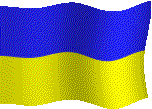 |
UKRAINE
UKRAINA |
12 SEPTEMBER
Mummies and War Heroes
KYIV It was a relaxing day. I walked across the city centre to another UNESCO World Heritage site in Kyiv, Lavra - the Cave Monasteries in the southern end of the centre, passing various monuments and public buildings. The Lavra is a spectacular treasure house of not only Eastern Orthodox art but of Black Sea nomadic culture as well. To many Ukrainian or Russian Orthodox believers, this is their Rome, the place where Eastern Orthodoxy took root in lands of the Eastern Slavs - Russians, Ukrainians and Belarusians. I love the icons and frescoes here – so elaborate and yet primeval in some ways. Again, the theme of the conversion of the Rus beholds. The spirituality of the place was overwhelming – the incense, monks with their dark hoods and robes, the ancient Slavonic liturgical music.
I like the Historical Treasures Museum, also within the Lavra, where
I was mesmerized by the golden Scythian jewelry and artifacts – mostly
excavated from the ancient burial mounds of the plains. Also fascinating
are the frescoes at the entrance of the Nearer Caves – depicting the journey
of the dead – from the deathbed to either heaven or hell, accompanied by
black agents of death, as well as saintly-white angels with their wings.
Macabre and amazing at the same time.
Like the devoted pilgrims, I bought a candle and carried it along (lighted
of course) the 200 meters walk through the famous cave passageways of the
Nearer and Further Caves of the Lavra. In these narrow passages,
well preserved bodies of monks and saints were displayed in their glass
coffins - the bodies were dressed in rich colourful bishop's costumes while
faces were covered. In each of the coffin, a darkened, mummified
hand is exposed. It was touching watching the pilgrims kissing these
coffins, in particular, the area of the glass just above the exposed hand.
Some raised their little children above the holy relics as if to introduce
their loved ones to the ancients, and to seek their blessings.
After icons and mummified saints, I visited the other end of the religious spectrum - Museum and Memorial of the Great Patriotic War - the almost godless mega-monument built by the Soviet Government to commemorate the WWII. This is a gigantic temple to the legendary individual sacrifice that communism loudly proclaimed. Amazing exhibits and design. Military music played out through loudspeakers in the entire park. A pity I didn't understand Russian or Ukrainian. The Afghan War Museum was next to it - the Vietnam of USSR - it's sad looking at pictures of those young faces – all with their lives ended between 1979 and 1989. It’s sad but glorious to die as a victor, but sad and always forgotten to die in a lost war.
I returned to the city central, to Khreshchatyk, Kyiv’s thoroughfare.
It’s Sunday and this beautiful, wide avenue becomes a pedestrian street.
Many teenagers were roller-skating on the boulevard, and a band was playing
in the Independence Square at the eastern end of the street. The
square itself was crowded with families and young people, enjoying themselves.
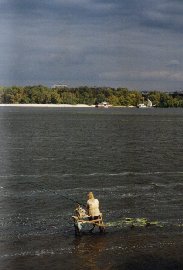 |
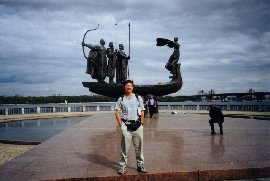 |
|
|
|
The flashy new shops and neon lights of Khreshchatyk were most deceiving,
for the country is now in a state of deep depression since the Russian
financial crisis. Archaic laws, rampant corruption and unfavourable
investment climate have further discouraged investors and forced existing
ones to pull out. The Ukrainian taxman is more interested in collecting
tax penalties than the promotion of economic activity through non-punitive
tax policies. Naturally, as they receive 30% of any tax penalties
collected and these enable them to support pay rises, build fanciful offices
and put on new uniforms. The Ukrainian entrepreneur faces enormous
difficulty in doing business, as the army of taxmen is constantly holding
surprise checks on their records, to ensure full compliance of tax regulations
– near impossibility given the anti-business legislative environment and
a large number of mutually contradictory regulations. In any case,
it is the small and medium enterprises that suffer, while major offenders
bribe their way to maintain peace and order within their own fiefdoms.
Corruption is certain the order of the day. During my visit, the
news reported about Clinton’s purchase of a house in NYC which cost one
or two million dollars, payable by loan. Many Ukrainians compared this
to a former prime minister, Lazarenko, now wanted for corruption in Ukraine
and Switzerland. He had bought a house that’s worth seven million
dollars, fully paid by cash. Authorities are now searching for more
than US$500 million missing during his misrule.
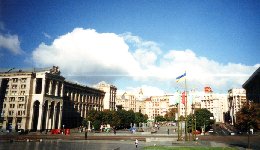 |
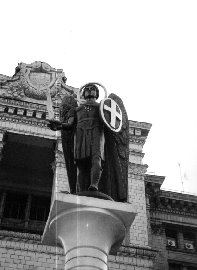 |
|
|
|
The enormous challenge of building a market economy is but one challenge
facing newly independent Ukraine. The Ukrainian state, after centuries
of Russification, is only struggling to establish its national identity.
The Ukrainian language, once so alien to ordinary Kyivians, has become
the language of choice. Government policy is a process of gradual
Ukrainianisation. Russian language TV channels have been shut down,
and all commercial and legal documents must be in the Ukrainian language.
Drastic moves ? Russian nationalists hate it but many Ukrainians
see them as efforts to build a national identity after years of deliberate
neglect and discrimination. In any case, given the centuries of Russification,
everybody’s finding the transformation process somewhat tough. I
was told that even government ministers struggle with Ukrainian.
Ministers are occasionally seen on TV asking their aides in Russian the
appropriate Ukrainian word to use. Perhaps, like their counterparts
in Ireland and elsewhere where the national tongue was nearly wiped out
after years of colonial rule, the younger generation of Ukraine will find
it easier to adopt the national language than anyone else.
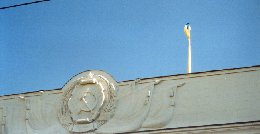 |
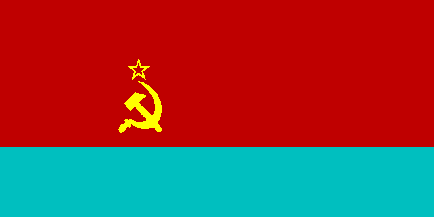 |
|
|
|
An interesting trend, however, is emerging. The Ukrainian language
is gradually being purged of its Russian elements. Instead, words
peculiar to the more nationalistic western Ukraine are being introduced.
Supporters claim that these are the “real Ukrainian” words devoid of Russian
influence. Critics maintain that these are in reality Polish and
Hungarian words, and one shouldn’t deny the historic characteristics Ukrainian
language and culture share with other Eastern Slavic cultures like the
Russian and Belarusian.
| RETURN TO FROM THE BALTIC TO THE BLACK SEA HOMEPAGE |